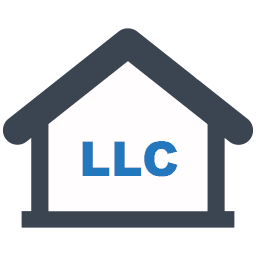When starting a business, one of the first major decisions you will make is choosing a business structure. The type of business structure you choose can impact many aspects of your business, such as daily operations, taxes, and your personal liability risk. To select the best structure for your small business, you want to consider a few essential factors such as upfront and on-going costs, if you will need liability protection, if you will seek outside investment and tax implications.
Table of Contents:Types of Business Structures
There are four basic types of business structures: Sole Proprietorship, Partnership, Limited Liability Company (LLC), and Corporation. These structures fall into two categories at the most basic level: Formal and Informal Business Structures.
- Formal Business Structures: LLCs and Corporations are formal structures with some up-front and ongoing costs and require state-level registration to start. Being formed formally with the state, businesses operating under these structures are separate entities from their owners.
- Informal Business Structures: Sole Proprietorships and Partnerships are informal structures. They require minimal or no registration requirements to start. As informal structures, these types of businesses have no separation between the owners and business. As a result of this difference, informal business structures are open to more risk as they lack personal liability protection.
Knowledge Base
What is Personal Liability Protection?
In the event that your business is sued or is unable to cover a business debt, personal liability protection prevents a business owner from being held personally responsible. This means that the owner’s personal assets like their home, car and personal bank account are protected.
Formal Business Structures
Formal business structures require a state-level filing to be legally formed. Formal business structures are distinct entities from their business owners. As a result, they offer limited liability protection for owners, meaning that their personal assets are protected. Formal structures offer various taxation options and benefits, which make them a go-to choice for many small business owners. The two main formal business structures are Limited Liability Company (LLC) and Corporation.
Formal Structures Table of Contents:- Limited Liability Company (LLC)
- Corporation
- Who are Formal Structures for?
- Advantages of Formal Business Structures
- Disadvantages of Formal Business Structures
- LLC vs Corporation: How to Choose

Limited Liability Company (LLC)
A limited liability company (LLC)is a flexible business structure that can have one or more owners. Owners in an LLC are known as members. An LLC offers a unique combination of limited liability protection for members and pass-through taxation by default. Also, LLCs that meet specific requirements can elect S Corporation taxation status from the IRS, which can provide considerable tax savings on self-employment taxes.
More About LLCs:

Corporation
A corporation is a business structure that is separate from its owners. Owners in a corporation are known as shareholders and are issued stock. Corporations offer limited liability protection for owners; thus, shareholders enjoy the profits of a Corporation through dividends and stock appreciation but are not personally liable for the business’s debts or lawsuits.
More About Corporations:
Who are Formal Structures for?
Formal business structures like LLCs and Corporations are good options for businesses that:
- Have potential or plan to be immediately profitable
- Are at increased liability or loss risk
- Will have a more extensive customer base
- Want more financing and investment opportunity
- Desire flexible taxation options
Advantages of Formal Business Structures
LLCs and Corporations offer three main advantages compared to informal business structures:
- Limited Liability Protection: Have peace of mind knowing that your personal assets like your car, home, and personal bank account won’t be at risk if your business accrues debt or faces a lawsuit.
- Increased Access to Financing and Investment Opportunities: Forming your businesses as a formal structure increases the likelihood of receiving financing to start and grow your business. Having a formal business structure makes it much easier to allow outside investors to fund your business.
- Taxation Flexibility and Benefits LLCs and Corporations have unique tax benefits that can suit a broader range of businesses. They also provide flexibility to elect different taxation classifications such as S Corporation taxation, which can offer tax savings.
Disadvantages of Formal Business Structures
LLCs and Corporations have two primary disadvantages compared to informal structures like Sole Proprietorships and Partnerships:
- Up Front Cost: When using a formal structure, you will need to pay a filing fee to the state and an on-going fee each year. Since you’ll only need to pay for business licenses and permits to get started, the out-of-pocket costs for creating an informal business will be lower.
- Time to Setup and On-Going Maintenance: When setting up a formal business, you’ll need to file formation documents to be legally registered. In addition to this, you’ll need to complete a brief filing each year to maintain good standing with your state.
LLC vs Corporation: How to Choose
When choosing between an LLC and a Corporation, more small businesses choose and benefit the most from forming as an LLC. Most small businesses choose an LLC due to the pass-through taxation it provides compared to the double taxation that a Corporation experiences.
More small business owners choose to form an LLC. Both provide limited liability protection, but an LLC allows its owner(s) to pay a lower overall tax rate. This is because LLCs are pass-through entities by default. In contrast, Corporations are subject to “double-taxation” by default at the federal level.
While most small businesses choose to start as an LLC, you may want to consider forming as a Corporation if you plan on seeking significant outside investment or angel funding. A Corporation allows investors to avoid excessive taxation by only taxing distributed profits. Since an LLC’s investors would be required to pay taxes on all profits, whether they were distributed or not, investors almost exclusively work with Corporations.
Informal Business Structures
Informal business structures operate without formal recognition of being separate legal entities from their owners. Sole Proprietorships and Partnerships are the most common types of informal businesses. Informal businesses generally require little to no formal registration. Suppose you begin conducting business activities without creating a separate legal entity like an LLC or Corporation. In that case, you are a sole proprietor (1 owner) or a partnership (2 or more owners). While this can make getting started with your business quicker and easier, it does have downsides such as being much harder to get loans and credit as well as having unlimited liability risk for business debts or lawsuits.
Informal Structures Table of Contents:- Sole Proprietorship
- Partnership
- Who are Informal Business Structures for
- Advantages of Informal Business Structures
- Disadvantages of Informal Business Structures
Sole Proprietorship
A sole proprietorship is the most basic form a business can take. If you are an individual and begin conducting business activities, you are automatically considered a Sole Proprietor. Sole Proprietorships are the most straightforward business structure to start, but they also have risks and limitations. Since a Sole Proprietor’s business is not separate from them, the owner can be held personally liable for any debts, obligations, and legal liabilities of the business. In addition to this, Sole Proprietors will also need to obtain a DBA Name to operate under a different name from their own.
More about Sole Proprietorships:
Partnership
Partnerships are the simplest business structure for businesses with two or more owners. Partnerships don’t directly pay taxes and instead file an information return, Form 1065. Partnerships are a pass-through taxation entity, meaning any profits (or losses) of the partnership are passed to and paid by their owners.
In a general partnership, the business owners have unlimited personal liability. Thus their personal assets could be at risk for any business debts, obligations, or in the event of a lawsuit. By default, partnerships are named after the business partners’ last names unless registered with the state. As a result, if operating under a name different from the partners’ last names, a DBA name filing will need to be completed.
More about Partnerships:
Who are Informal Business Structures for
Informal business structures like Sole Proprietorships and Partnerships are suitable structures for:
- Businesses that have minimal risk
- Don’t plan on needing outside investment or funding
- Testing a business idea before committing to a formal structure
- Are very small or are hobbies
Advantages of Informal Business Structures
Informal business types have a few advantages when compared to forming an LLC or Corporation:
- Lower Upfront Cost: Sole Proprietors and Partnerships require no formal registration thus are only required to obtain relevant business licenses and permits.
- Quicker to Get Started: With a lack of any legal paperwork or registration, you can get started as soon as your business is properly licensed.
Disadvantages of Informal Business Structures
Establishing a business that uses an informal structure is simple. However, it has some significant disadvantages that you will want to consider, such as:
- Unlimited Personal Liability: Your personal assets like your home, vehicle, and personal bank account could be at risk if your business is sued or has debts.
- Limited Potential for Growth It is much harder to get financing and investment to grow your business.
- Not as credible and brandable You must operate under your personal name(s), making it harder to create a credible brand
Business Structure Frequently Asked Questions (FAQs)
What are the 4 types of business?
The 4 main types of business structures are Sole Proprietor, Partnership, LLC and Corporation
What is the best business structure?
The best business structure will depend on a variety of factors such as the number of owners, taxation status preference and if the owner wants liability protection. Many small business owners prefer LLCs as they provide liability protection while still allowing pass-through taxation like Sole Proprietorships and Partnerships. Keep in mind that what will work best for you will vary based on what your specific needs are. If you’re not confident in a business structure you may want to seek the advice of an accountant and/or a lawyer.

